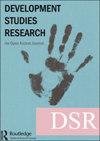An empirical analysis of sector-wise private investment for a small open economy
Q2 Social Sciences
引用次数: 1
Abstract
ABSTRACT The present study empirically analyses the sector-wise private investment behaviour in Pakistan using the autoregressive distributed lag model from 1964 to 2015. The results indicate that credit availability and infrastructural development considerably affect private investment in agriculture, industry, and services. However, the user cost of capital does not have any influence on investment. The response of investment demand to credit availability is inelastic (i.e. 0.259) for agriculture but relatively higher for the industrial sector with a magnitude of 0.554. However, its value is slightly higher than the unit elastic value (1.059) in services. Fertiliser use positively impacts investment in agriculture, which is negatively affected by access to water. The values of the corresponding coefficients are 0.726 and −2.731, respectively. Remittances and foreign direct investment positively contribute to private investment in services. Openness significantly demotes private investment in services, and its magnitude is relatively high (−5.127). The findings signify and implicate the role of water availability, government support, and financial development in the agricultural sector. However, a stable political environment and cost of investment are very important for investment activities in the industry. Nevertheless, the role of openness in investment in services is vital.小型开放型经济中私营部门投资的实证分析
摘要本研究采用自回归分布滞后模型对1964年至2015年巴基斯坦私营部门的投资行为进行了实证分析。结果表明,信贷供应和基础设施发展对农业、工业和服务业的私人投资产生了重大影响。然而,资金的使用成本对投资没有任何影响。农业的投资需求对信贷可用性的反应是无弹性的(即0.259),但工业部门的投资需求相对较高,幅度为0.554。然而,它的价值略高于服务业的单位弹性值(1.059)。化肥的使用对农业投资产生了积极影响,而农业投资则受到供水的负面影响。相应系数的值分别为0.726和−2.731。汇款和外国直接投资对服务业的私人投资作出了积极贡献。开放显著降低了私人对服务业的投资,其规模相对较高(−5.127)。研究结果表明并暗示了水供应、政府支持和金融发展在农业部门的作用。然而,稳定的政治环境和投资成本对该行业的投资活动非常重要。然而,开放在服务业投资中的作用至关重要。
本文章由计算机程序翻译,如有差异,请以英文原文为准。
求助全文
约1分钟内获得全文
求助全文
来源期刊

Development Studies Research
Social Sciences-Development
CiteScore
3.20
自引率
0.00%
发文量
20
审稿时长
12 weeks
期刊介绍:
Development Studies Research ( DSR) is a Routledge journal dedicated to furthering debates in development studies. The journal provides a valuable platform for academics and practitioners to present their research on development issues to as broad an audience as possible. All DSR papers are published Open Access. This ensures that anyone, anywhere can engage with the valuable work being carried out by the myriad of academics and practitioners engaged in development research. The readership of DSR demonstrates that our goal of reaching as broad an audience as possible is being achieved. Papers are accessed by over 140 countries, some reaching over 9,000 downloads. The importance of the journal to impact is thus critical and the significance of OA to development researchers, exponential. Since its 2014 launch, the journal has examined numerous development issues from across the globe, including indigenous struggles, aid effectiveness, small-scale farming for poverty reduction, sustainable entrepreneurship, agricultural development, climate risk and the ‘resource curse’. Every paper published in DSR is an emblem of scientific rigour, having been reviewed first by members of an esteemed Editorial Board, and then by expert academics in a rigorous review process. Every paper, from the one examining a post-Millennium Development Goals environment by one of its architects (see Vandermortele 2014), to ones using established academic theory to understand development-imposed change (see Heeks and Stanforth 2015), and the more policy-oriented papers that contribute valuable recommendations to policy-makers and practitioners (see DSR Editor’s Choice: Policy), reaches a multidisciplinary audience.
 求助内容:
求助内容: 应助结果提醒方式:
应助结果提醒方式:


